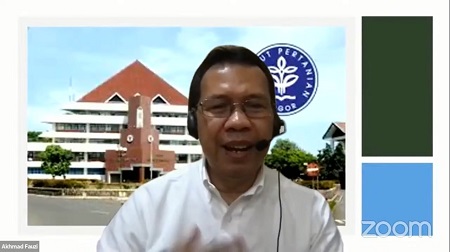Prof. Dr. Akhmad Fauzi: Indonesia’s Ecological Deficit Reaches 42 Percent
Prof. Dr. Akhmad Fauzi: Indonesia’s Ecological Deficit Reaches 42 Percent
 Economic development practices in Indonesia often inconsistency with the preservation of natural resources. This will cause ecological damage. Based on data from the Global Footprint Network in 2020, Indonesia has an ecological deficit of 42 percen. This means that the consumption of resources is higher than currently available. This will cause the natural carrying capacity to decrease.
Economic development practices in Indonesia often inconsistency with the preservation of natural resources. This will cause ecological damage. Based on data from the Global Footprint Network in 2020, Indonesia has an ecological deficit of 42 percen. This means that the consumption of resources is higher than currently available. This will cause the natural carrying capacity to decrease.
Economic development policies in Indonesia still don’t take natural capital seriously. Professor of IPB University from the Department of Resource and Environmental Economics, Faculty of Economics and Management (FEM), Prof. Dr. Akhmad Fauzi, said that Indonesia’s natural capital index is still low at 86. Even though tropical countries are generally in the top ten rankings of the natural capital index. There is considerable damage to nature in Indonesia.
“Natural damage is, for example, caused by change of land use. The rate of environmental pollution, especially water, is also high. Besides that, the diversity of nature also decreasing. This has weakened our national economy. Ignoring natural capital results in enlarging economic inequality, ”said Prof. Akhmad when he was a speaker for a discussion held by the West Java Regional Development Planning Agency (Bappeda) (5/2).
According to him, economic development cannot be separated from environmental sustainability. In addition, local wisdom that exists in the community must also be considered properly. Usually, development that includes community local wisdom will be in harmony with environmental sustainability. So it is important for Indonesia to make efforts to improve the development paradigm towards a more sustainable direction.
Furthermore, Prof. Akhmad emphasized that there is a need to reorient capital management in regional development in Indonesia. The first strategy is develop factors to increase the complexity of resource productivity to increase the added value of a product. Next is to utilize resources with local wisdom in the community.
“The extraction of natural resources often causes hysteresis phenomena. That is the effect that lasts a long time even though the cause has been resolved. For example the impact of deforestation. The strategy is to use old knowledge to make a new breakthrough. Raising the regional economy through local resources, raising the regional economy, “added Prof. Akhmad.
Finally, the market price of natural resources does not reflect actual conditions in nature. It is important to understand the costs that future generations have to pay due to the destruction of nature. Natural resource extraction is not just for one generation. Natural capital governance must continue to be improved for the welfare of current and future generations. (Nv / Zul)


